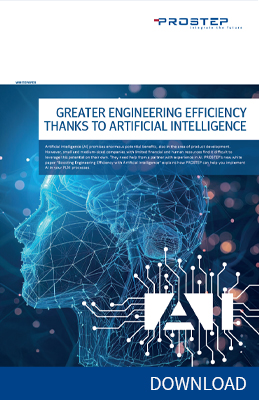Darmstadt, November 2017 – Industry 4.0 and the Internet of Things (IoT) offer an opportunity to develop products better, manufacture them more flexibly and maintain them more efficiently. However, small and medium-sized companies in particular find it difficult to decide just where to start when it comes to linking products and services intelligently. To help them navigate these choppy waters, PROSTEP offers an Industry 4.0 assessment that is based on the VDMA's Industry 4.0 guidelines but also analyzes PLM-related aspects. One highlight of the day-and-a-half long workshop is a creative phase in which the participants work together to develop ideas for new products and business models.
Many companies are faced with the question of where they should start with their Industry 4.0 initiatives. The answer depends to a great extent on each individual company's maturity level. The starting point for PROSTEP's Industry 4.0 assessment is therefore determining where a company currently stands when it comes to Industry 4.0 and defining where it wants to be in one, three and five years' time. The short, medium and long-term measures necessary to achieve these aims are determined on the basis of this information.
PROSTEP uses a toolbox of methods to analyze the level of Industry 4.0 readiness. This toolbox also helps define the objectives to be achieved. It was originally developed by the VDMA in cooperation with the Department of Computer Integrated Design (DiK) at Darmstadt Technical University and the wbk Institute of Production Science at Karlsruhe Institute of Technology (KIT).
PROSTEP has extended this toolbox to include PLM-specific criteria that can be aligned with the company's PLM capabilities. It examines, for example, the question of the form in which the product data is kept: Whether the 2D drawing is still the master, whether the 2D master together with the 3D data is file-based or managed in a PDM system, whether the 3D model is the master or whether it is already the sole source of information. PROSTEP considers the question to be so important because PLM and digital masters provide the basis for Industry 4.0 solutions.
A key benefit of the workshop for the customer is the utilization of a uniform methodology by experienced consultants, who are thus able to compare the results with those of other workshops. The current and target states are recorded and documented to facilitate management decisions and help identify the first steps toward Industry 4.0 – all at a clearly identifiable level of internal effort and expense.
